- The college was founded in 1933 and named for Carl Albert, former Speaker of the U.S. House of Representatives. The mission of the college is to prepare students – as Carl Albert was prepared – for a lifetime of service in a global society.
School Highlights
Carl Albert State College serves 2,242 students (49% of students are full-time).
The college's student:teacher ratio of 11:1 is lower than the state community college average of 18:1.
Minority enrollment is 52% of the student body (majority American), which is less than the state average of 56%.
Quick Stats (2025)
- Enrollment: 2,242 students
- In-state tuition: $3,003
- Out-state tuition: $6,210
- Student:teacher ratio: 11:1
- Minority enrollment: 52%
- Source: Integrated Postsecondary Education Data System (IPEDS)
Top Rankings
Carl Albert State College ranks among the top 20% of public schools in Oklahoma for:
Category
Attribute
Affordability
Debt For Students
School Overview
The teacher population of 199 teachers has stayed relatively flat over five years.
Carl Albert State College
(OK) Community College Avg.
Carnegie Classification
Associate's Colleges: High Transfer-High Traditional
Baccalaureate/Associate's Colleges: Mixed Baccalaureate/Associate's
Institution Level
At least 2 but less than 4 years
At least 2 but less than 4 years
Institution Control
Public
Public
Total Faculty
199 staff
154 staff
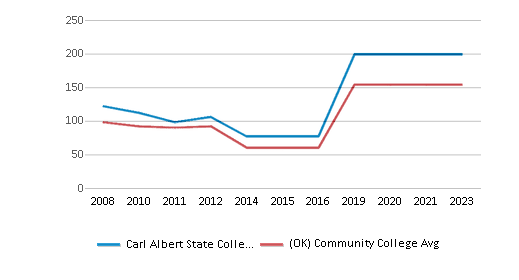
School Calendar
Student Body
The student population of Carl Albert State College has grown by 17% over five years.
The student:teacher ratio of 11:1 has increased from 10:1 over five years.
The Carl Albert State College diversity score of 0.69 is less than the state average of 0.76. The school's diversity has stayed relatively flat over five years.
Total Enrollment
2,242 students
1,473 students
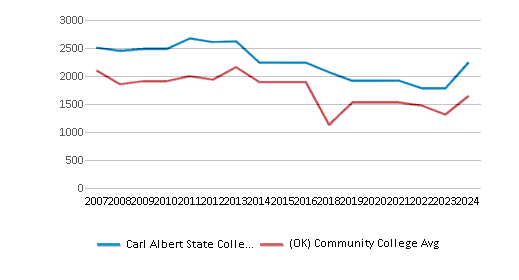
Student : Teacher Ratio
11:1
18:1
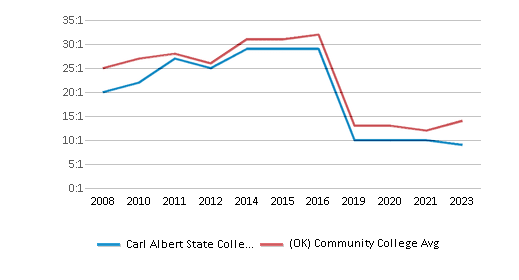
# Full-Time Students
1,098 students
663 students
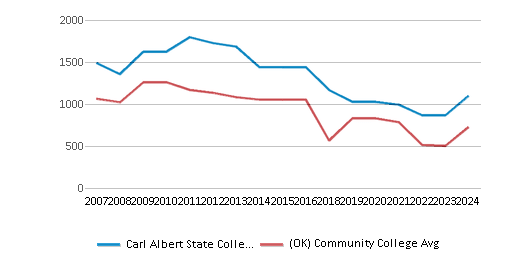
# Part-Time Students
1,144 students
1,058 students
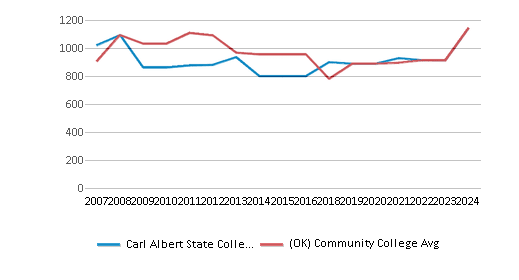
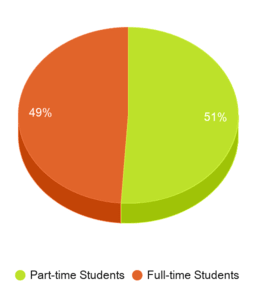
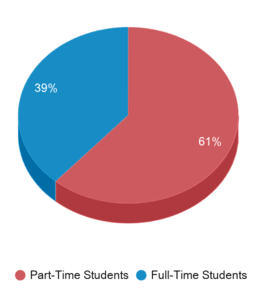
# Enrollment Undergraduate
224 students
236 students
# Full-Time Undergraduate Students
1,098 students
610 students
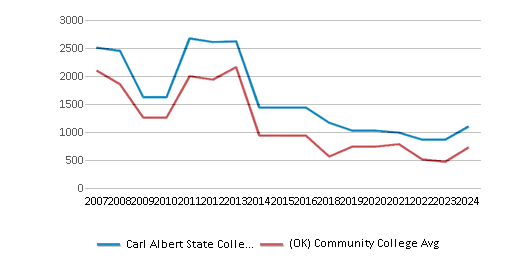
# Full-Time Graduate Students
n/a
5 students
# Part-Time Undergraduate Students
1,144 students
972 students
# Part-Time Graduate Students
n/a
14 students
Total Dormitory Capacity
300 students
300 students
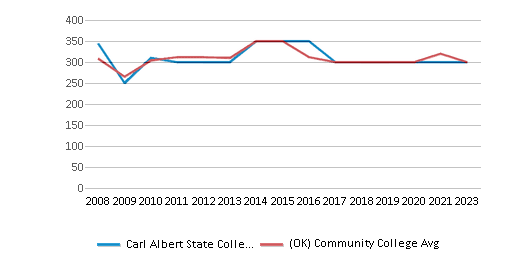
% American Indian/Alaskan
23%
8%
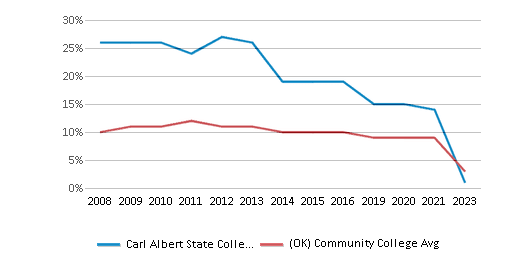
% Asian
1%
4%
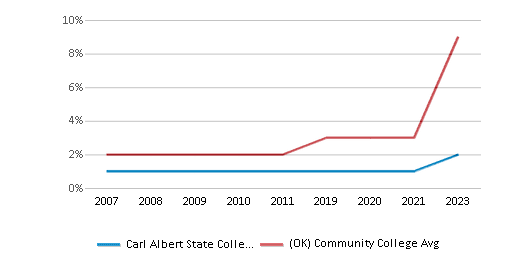
% Hispanic
8%
11%
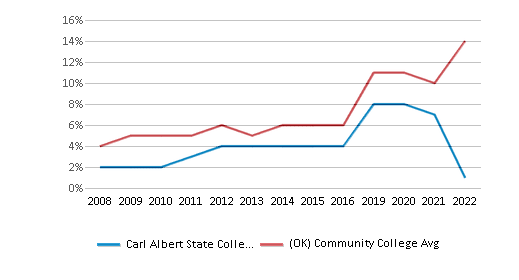
% Black
2%
10%
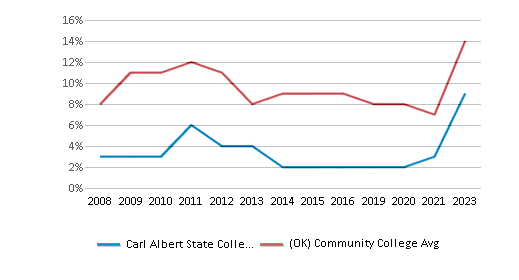
% White
48%
44%
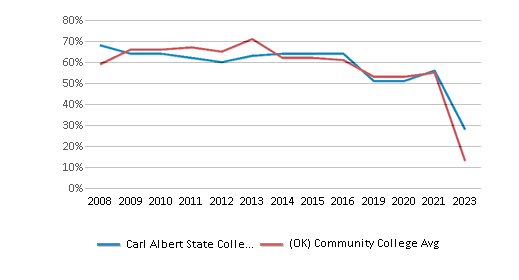
% Hawaiian
n/a
8%
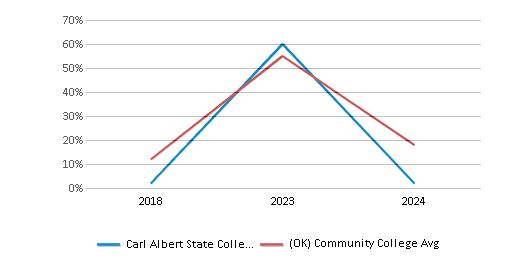
% Two or more races
15%
10%
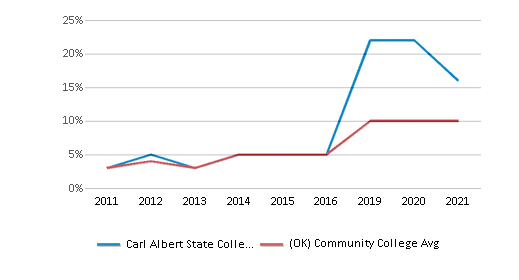
% Non Resident races
n/a
1%
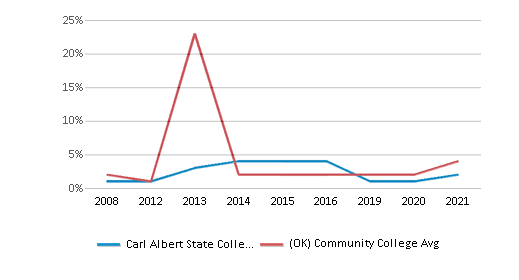
% Unknown races
3%
4%
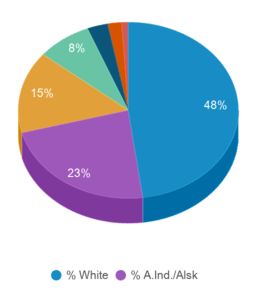
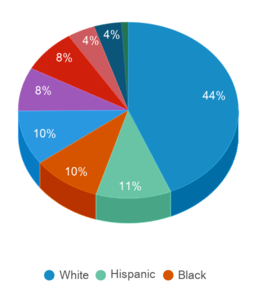
Diversity Score
0.69
0.76
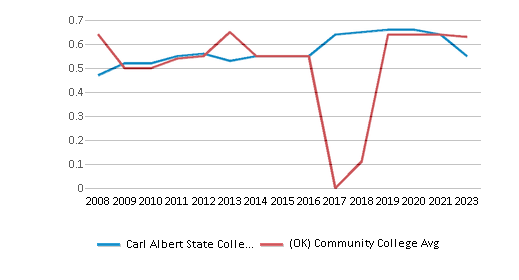
College Completion Rate (Students who graduate in less than 4 years)
0.4356%
0.5629%
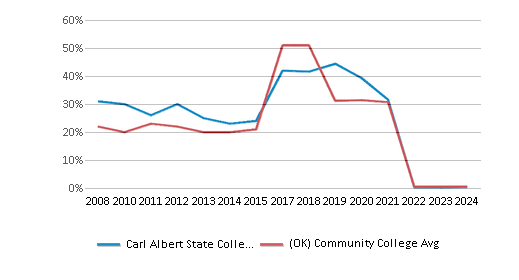
College Completion Rate (Students who graduate in 4 years or more than 4 years)
n/a
0.1525%
Average Graduate Earnings (10 Years)
$30,100
$34,700
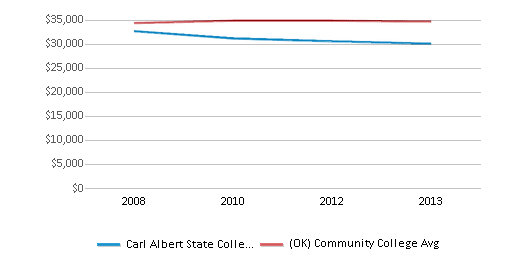
Tuition and Acceptance Rate
The public in-state tuition of $3,003 is less than the state average of $3,475. The in-state tuition has declined by 21% over four years.
The public out-state tuition of $6,210 is less than the state average of $7,963. The out-state tuition has declined by 21% over four years.
In-State Tuition Fees
$3,003
$3,475
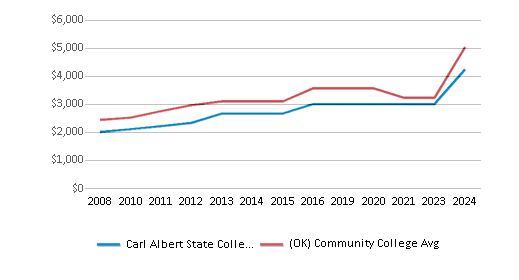
Out-State Tuition Fees
$6,210
$7,963
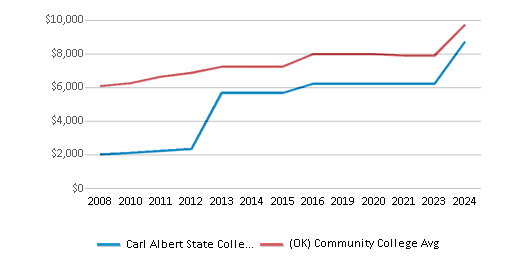
% Students Receiving Some Financial Aid
91%
88%
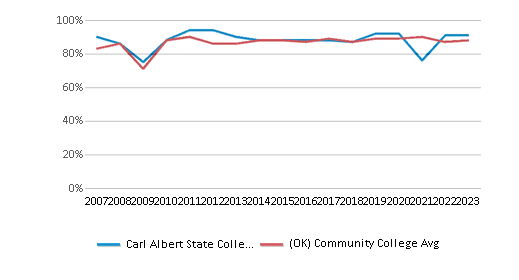
Median Debt for Graduates
$8,500
$12,000
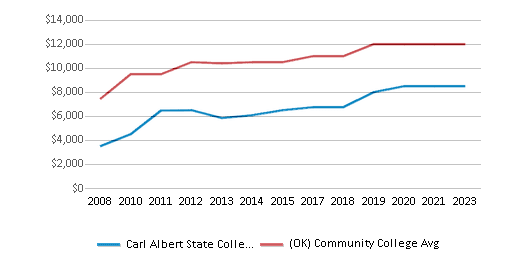
Median Debt for Dropouts
$5,000
$5,889
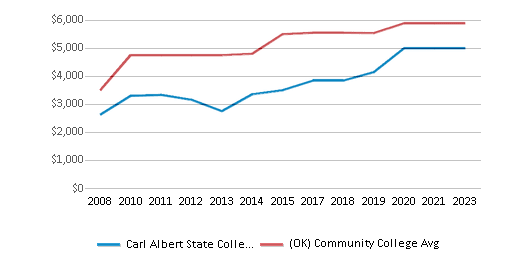
Acceptance Rate
n/a
55%
SAT Reading
n/a
387
SAT Math
n/a
475
ACT Composite
n/a
18
ACT English
n/a
17
ACT Math
n/a
18
Source: 2024 (or latest year available) Integrated Postsecondary Education Data System (IPEDS)
School Notes
- Carl Albert State College is the sixth fastest-growing two-year college in the nation. It is dedicated to developing students into leaders who are life-long learners, prepared for important roles in the workforce, and proficient with cutting-edge technology. Carl Albert State College is located in Poteau, Oklahoma, which has been listed as one of America's 100 best small towns. Amid the beautiful mountains and streams of eastern Oklahoma, Poteau is home to thriving businesses, rapidly-developing industries and excellent quality of life. The college also has a branch campus in Sallisaw, Oklahoma, which is located in the fast-growing community surrounding Interstate 40, one of America's arterial roads. CASC offers several degree programs that cannot be found anywhere else in the area, including Athletic Training and Radiography. CASC's excellent nursing program regularly receives high accolades from peers and accountability groups. A few of CASC's degree programs are offered entirely online. CASC has six academic living centers with spacious rooms and Internet access. The college has 31 student-run organizations that meet students' interests in culture, media, performance, professional, academic, and community service areas. CASC has a cardiovascular fitness center, a student union that serves healthy meals designed by a professional chef, and numerous computer labs that provide access to the Web and many online databases. The Joe E. White Library is a hub of student research. CASC is also home to NJCAA sports including softball, baseball, and basketball.
Frequently Asked Questions
How much does Carl Albert State College cost?
Carl Albert State College's tuition is approximately $3,003 for In-State students and $6,210 for Out-State students.
What schools are Carl Albert State College often compared to?
Carl Albert State Collegeis often viewed alongside schools like Connors State College by visitors of our site.
What is Carl Albert State College's ranking?
Carl Albert State College ranks among the top 20% of community college in Oklahoma for: Least expensive tuition and Least debt for graduating students.
Recent Articles

Obtaining Your Bachelor's Degree at a Community College
Explore the evolving landscape of community colleges offering bachelor's degrees, addressing affordability, accessibility, and workforce needs.

A to Z of Community College Certificates and Courses
From business and healthcare to technology and skilled trades, the article showcases the breadth of options available to students seeking to enhance their knowledge, develop new skills, or pursue career advancement.

What is a Community College?
This comprehensive guide explains what a community college is, its history, and its role in higher education. It covers the types of programs offered, differences from four-year colleges, benefits of attending, and important considerations for prospective students, providing valuable insights for those exploring educational options.










